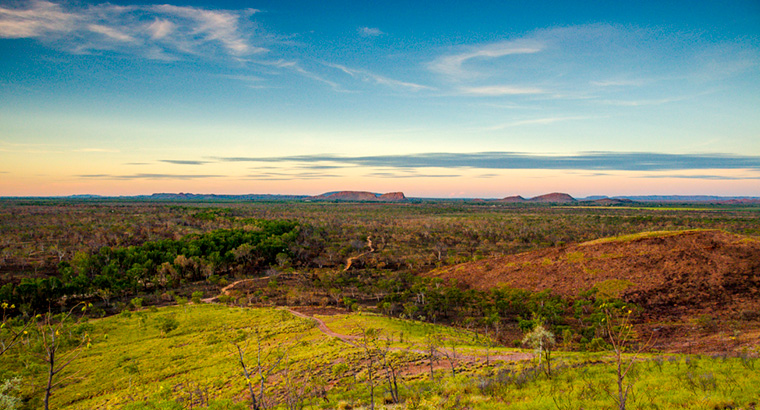Profile
A GP in Kununurra: Dr Catherine Engelke
Dr Catherine Engelke talks to newsGP about life as a GP in Western Australia’s remote north.
 Dr Engelke, who has lived in the Kimberley region her whole life, worked as a midwife before becoming a GP.
Dr Engelke, who has lived in the Kimberley region her whole life, worked as a midwife before becoming a GP.
‘Are there limits to rural and remote work? Only your imagination.’
That’s GP Dr Catherine Engelke of Kununurra in Western Australia, a 3200 km drive from Perth.
Dr Engelke has lived in the Kimberley, in the north-west of WA, for her whole life. Born in Derby, she was raised in Halls Creek and worked across the region as a midwife, starting straight after high school. While she had always dreamed of being a doctor, that particular vocation felt out of reach until she was spurred by a realisation: how could she tell her children to follow their dreams if she had not?
Dr Engelke started her training as a doctor in Perth in 2003. She knew, however, that she would return to the north-west.
‘I love the lifestyle, so it wasn’t difficult to end up here,’ she told newsGP.
Dr Engelke has raised two children in Kununurra with her husband, an agricultural scientist. As for the work, the dream has come true.
‘Working in rural and remote medicine is by far the most rewarding thing I’ve ever done,’ she said.
The variety of the work – one day she might be in the hospital emergency department in Kununurra, the next driving south to the small Aboriginal community of Warmun – is one of Dr Engelke’s main drivers as a healthcare provider.
 The isolated nature of much of WA’s north-west means Dr Engelke practises a broad range of healthcare throughout the region.
The isolated nature of much of WA’s north-west means Dr Engelke practises a broad range of healthcare throughout the region.
‘I always thought I would be a GP – and I am – but working up here, you don’t have immediate access to specialists,’ she said. ‘So you do a lot more of the managing of patients in consultation with specialists, who could be 1100 km away in Darwin, or 3200 away in Perth.
‘You develop confidence and your skill mix in handling often quite unwell patients. You have to learn to trust your decisions managing patients. That grows quickly, out of necessity.’
One of the challenges for Dr Engelke comes when patients need specialist treatment only available in Perth or Darwin. Many of her patients have lived their whole lives in Kununurra or Warmun, and are reluctant to leave their community.
‘When you’re asking a patient to leave their community, it’s a huge cultural shock,’ she said. ‘It’s not just Indigenous people; lots of community members in Kununurra don’t leave. People don’t want to be sent away – none of us do. So going to Perth can be overwhelming and quite daunting.’
The trick, according to Dr Engelke, is to build up trust and show that you’re here for the long term. Both Aboriginal and Torres Strait Islander and non-Indigenous residents have seen many people come for a short contract and then leave to head back to the big cities.
‘Some people ask, how long are you here for? Are you permanent? They want to know whether to invest their time in you. And that’s reasonable,’ Dr Engelke said. ‘I’ve spent my whole life in the Kimberley and people know my family name. So that’s an advantage.
‘It also matters who we both know. That’s the first step, and then you need to demonstrate your credibility too.’
Over her seven years in Kununurra, Dr Engelke has worked to build connections and ensure continuity of care.
‘Because I’ve built trust, people will say, “If Dr Catherine asks me to go to Perth, I really need to go”,’ she said.
Distance is a factor for transferring more seriously unwell patients. When she calls for specialist advice in Perth, Dr Engelke makes sure she mentions exactly how far away she is.
‘I say I’m 3200 km from you, and they’ll say, “Really? Are you even in Western Australia?”’ she said. ‘I start with that so when we’re talking about care, they’ve got the context.
‘If they say the patient needs to be here in four hours, that would be ideal. But they’re never going to get there in that time. So the question is then, what can we do, here, while we wait for the Flying Doctors?’
Even though she is a long way from the major cities, Dr Engelke never feels cut off from the medical community.
‘You may be physically isolated, but you are never alone,’ she said. ‘There’s always someone you can talk to about cases.’
Catherine-Engelke rural-gp rural-health western-australia
newsGP weekly poll
Would it affect your prescribing if proven obesity management medications were added to the PBS?